TED演讲:想成功,请多睡一会儿 英文演讲稿
TED英语演讲:成功的真实秘诀
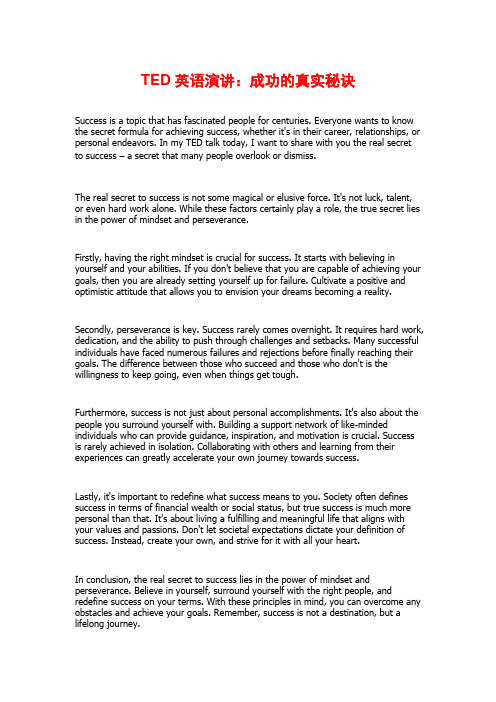
TED英语演讲:成功的真实秘诀Success is a topic that has fascinated people for centuries. Everyone wants to know the secret formula for achieving success, whether it's in their career, relationships, or personal endeavors. In my TED talk today, I want to share with you the real secretto success – a secret that many people overlook or dismiss.The real secret to success is not some magical or elusive force. It's not luck, talent, or even hard work alone. While these factors certainly play a role, the true secret lies in the power of mindset and perseverance.Firstly, having the right mindset is crucial for success. It starts with believing in yourself and your abilities. If you don't believe that you are capable of achieving your goals, then you are already setting yourself up for failure. Cultivate a positive and optimistic attitude that allows you to envision your dreams becoming a reality.Secondly, perseverance is key. Success rarely comes overnight. It requires hard work, dedication, and the ability to push through challenges and setbacks. Many successful individuals have faced numerous failures and rejections before finally reaching their goals. The difference between those who succeed and those who don't is the willingness to keep going, even when things get tough.Furthermore, success is not just about personal accomplishments. It's also about the people you surround yourself with. Building a support network of like-minded individuals who can provide guidance, inspiration, and motivation is crucial. Success is rarely achieved in isolation. Collaborating with others and learning from their experiences can greatly accelerate your own journey towards success.Lastly, it's important to redefine what success means to you. Society often defines success in terms of financial wealth or social status, but true success is much more personal than that. It's about living a fulfilling and meaningful life that aligns with your values and passions. Don't let societal expectations dictate your definition of success. Instead, create your own, and strive for it with all your heart.In conclusion, the real secret to success lies in the power of mindset and perseverance. Believe in yourself, surround yourself with the right people, and redefine success on your terms. With these principles in mind, you can overcome any obstacles and achieve your goals. Remember, success is not a destination, but a lifelong journey.。
早睡早起精彩人生 中英文演讲稿
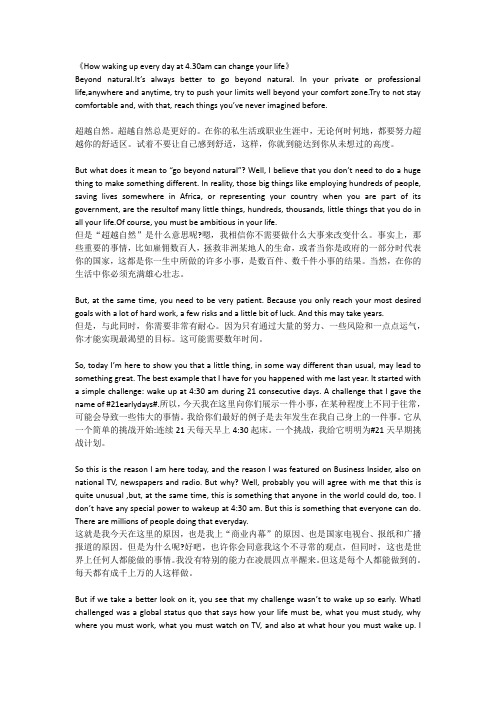
《How waking up every day at 4.30am can change your life》Beyond natural.It’s always better to go beyond natural. In your private or professional life,anywhere and anytime, try to push your limits well beyond your comfort zone.Try to not stay comfortable and, with that, reach things you’ve never imagined before.超越自然。
超越自然总是更好的。
在你的私生活或职业生涯中,无论何时何地,都要努力超越你的舒适区。
试着不要让自己感到舒适,这样,你就到能达到你从未想过的高度。
But what does it mean to “go beyond natural”? Well, I believe that you don’t need to do a huge thing to make something different. In reality, those big things like employing hundreds of people, saving lives somewhere in Africa, or representing your country when you are part of its government, are the resultof many little things, hundreds, thousands, little things that you do in all your life.Of course, you must be ambitious in your life.但是“超越自然”是什么意思呢?嗯,我相信你不需要做什么大事来改变什么。
Richard St.John在Ted英语演讲:成功的八个秘诀(中英双语)

Richard St.John在Ted英语演讲:成功的八个秘诀(中英双语)小编今天推荐给大家的是Richard 在Ted英语演讲:成功的八个秘诀(中英双语),仅供参考,希望对大家有用。
关注网获得更多内容。
Richard 在Ted英语演讲:成功的八个秘诀(中英双语) This is really a two-hour presentation I give to high school students, cut down to three minutes. And it all started one day on a plane, on my way to TED, seven years ago. And in the seat next to me was a high school student, a teenager, and she came from a really poor family.这真的是一个我给高中学生做的2个小时的演讲现在缩到了3分钟所有的一切都是从7年前的一天开始,我坐在飞往TED会议的飞机上。
在我邻座坐的是一个高中生,一个十几岁的年轻人。
她生于一个贫穷的家庭而且她的愿望是成就一番事业所以她问了我一个简单的小问题。
And she wanted to make something of her life, and she asked me a simple little question. She said, "What leads to success?" And I felt really badly, because I couldn't give her a good answer. So I get off the plane, and I come to TED. And I think, jeez, I'm in the middleof a room of successful people! So why don't I ask them what helped them succeed, and pass it on to kids? So here we are, seven years, 500 interviews later, and I'm gonna tell you what really leads to success and makes TED-sters tick.她说:“怎样做才能成功呢?”我当时觉得糟透了因为我不能给她一个满意的答案后来我下了飞机,来到TED 忽然间我想到,天啊,我置身于一屋子成功人士之中! 为什么我不问问他们是怎样走向成功的呢。
ted演讲稿我们为什么要睡眠英文
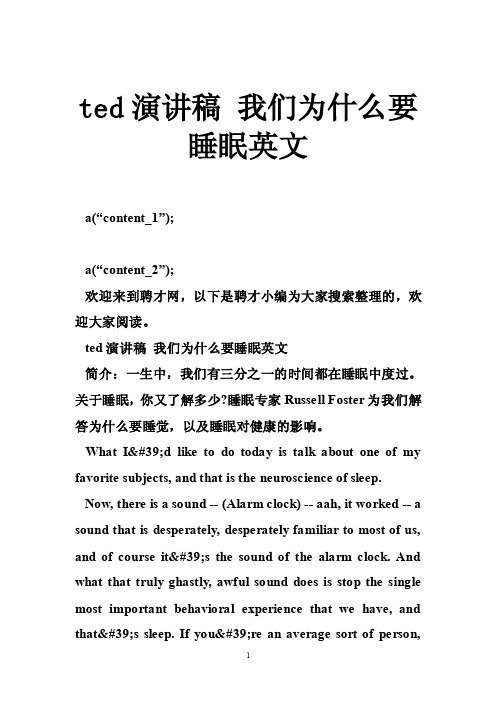
ted演讲稿我们为什么要睡眠英文a(“content_1”);a(“content_2”);欢迎来到聘才网,以下是聘才小编为大家搜索整理的,欢迎大家阅读。
ted演讲稿我们为什么要睡眠英文简介:一生中,我们有三分之一的时间都在睡眠中度过。
关于睡眠,你又了解多少?睡眠专家Russell Foster为我们解答为什么要睡觉,以及睡眠对健康的影响。
What I'd like to do today is talk about one of my favorite subjects, and that is the neuroscience of sleep. Now, there is a sound -- (Alarm clock) -- aah, it worked -- a sound that is desperately, desperately familiar to most of us, and of course it's the sound of the alarm clock. And what that truly ghastly, awful sound does is stop the single most important behavioral experience that we have, and that's sleep. If you're an average sort of person,36 percent of your life will be spent asleep, which means that if you live to 90, then 32 years will have been spent entirely asleep.Now what that 32 years is telling us is that sleep at some level is important. And yet, for most of us, we don't give sleep a second thought. We throw it away. We really just don't think about sleep. And so what I'd like to do today is change your views, change your ideas and your thoughts about sleep. And the journey that I want to take you on, we need to start by going back in time.Enjoy the honey-heavy dew of slumber. Any ideas who said that? Shakespeare's Julius Caesar. Yes, let me give you a few more quotes. O sleep, O gentle sleep, nature's soft nurse, how have I frighted thee? Shakespeare again, from -- I won't say it -- the Scottish play. [Correction: Henry IV, Part 2] (Laughter) From the same time: Sleep is the golden chain that ties health and our bodies together. Extremely prophetic, by Thomas Dekker, another Elizabethan dramatist.But if we jump forward 400 years, the tone about sleep changes somewhat. This is from Thomas Edison, from the beginning of the 20th century. Sleep is a criminal waste oftime and a heritage from our cave days. Bang. (Laughter) And if we also jump into the 1980s, some of you may remember that Margaret Thatcher was reported to have said, Sleep is for wimps. And of course the infamous -- what was his name? -- the infamous Gordon Gekko from Wall Street said, Money never sleeps.What do we do in the 20th century about sleep? Well, of course, we use Thomas Edison's light bulb to invade the night, and we occupied the dark, and in the process of this occupation, we've treated sleep as an illness, almost. We've treated it as an enemy. At most now, I suppose, we tolerate the need for sleep, and at worst perhaps many of us think of sleep as an illness that needs some so rt of a cure. And our ignorance about sleep is really quite profound.Why is it? Why do we abandon sleep in our thoughts? Well, it's because you don't do anything much while you're asleep, it seems. You don't eat. You don't drink. And you don't have sex. Well, most of us anyway. And so therefore it's -- Sorry. It's a complete waste of time, right? Wrong. Actually, sleep is an incredibly important part of our biology, and neuroscientistsare beginning to explain why it's so very important. So let's move to the brain.Now, here we have a brain. This is donated by a social scientist, and they said they didn't know what it was, or indeed how to use it, so -- (Laughter) Sorry. So I borrowed it. I don't think they noticed. Okay. (Laughter)The point I'm trying to make is that when you're asleep, this thing doesn't shut down. In fact, some areas of the brain are actually more active during the sleep state than during the wake state. The other thing that's really important about sleep is that it doesn't arise from a single structure within the brain, but is to some extent a network property, and if we flip the brain on its back -- I love this little bit of spinal cord here -- this bit here is the hypothalamus, and right under there is a whole raft of interesting structures, not least the biological clock. The biological clock tells us when it's good to be up, when it's good to be asleep, and what that structure does is interact with a whole raft of other areas within the hypothalamus, the lateral hypothalamus, the ventrolateral preoptic nuclei. All of those combine, and they sendprojections down to the brain stem here. The brain stem then projects forward and bathes the cortex, this wonderfully wrinkly bit over here, with neurotransmitters that keep us awake and essentially provide us with our consciousness. So sleep arises from a whole raft of different interactions within the brain, and essentially, sleep is turned on and off as a result of a range ofOkay. So where have we got to? We've said that sleep is complicated and it takes 32 years of our life. But what I haven't explained is what sleep is about. So why do we sleep? And it won't surprise any of you that, of course, the scientists, we don't have a consensus. There are dozens of different ideas about why we sleep, and I'm going to outline three of those.The first is sort of the restoration idea, and it's somewhat intuitive. Essentially, all the stuff we've burned up during the day, we restore, we replace, we rebuild during the night. And indeed, as an explanation, it goes back to Aristotle, so that's, what, 2,300 years ago. It's gone in and out of fashion. It's fashionable at the moment because what's been shown is that within the brain, a whole raft of genes have been shown to be turned ononly during sleep, and those genes are associated with restoration and metabolic pathways. So there's good evidence for the whole restoration hypothesis.What about energy conservation? Again, perhaps intuitive. You essentially sleep to save calories. Now, when you do the sums, though, it doesn't really pan out. If you compare an individual who has slept at night, or stayed awake and hasn't moved very much, the energy saving of sleeping is about 110 calories a night. Now, that's the equivalent of a hot dog bun. Now, I would say that a hot dog bun is kind of a meager return for such a complicated and demanding behavior as sleep. So I'm less convinced by the energy conservation idea.But the third idea I'm quite attracted to, which is brain processing and memory consolidation. What we know is that, if after you've tried to learn a task, and you sleep-deprive individuals, the ability to learn that task is smashed. It's really hugely attenuated. So sleep and memory consolidation is also very important. However, it's not just the laying down of memory and recalling it. What's turned out to be really exciting is that our ability to come up with novel solutions to complex problemsis hugely enhanced by a night of sleep. In fact, it's been estimated to give us a threefold advantage. Sleeping at night enhances our creativity. And what seems to be going on is that, in the brain, those neural connections that are important, those synaptic connections that are important, are linked and strengthened, while those that are less important tend to fade away and be less important.Okay. So we've had three explanations for why we might sleep, and I think the important thing to realize is that the details will vary, and it's probable we sleep for multiple different reasons. But sleep is not an indulgence. It's not some sort of thing that we can take on board rather casually. I think that sleep was once likened to an upgrade from economy to business class, you know, the equiavlent of. It's not even an upgrade from economy to first class. The critical thing to realize is that if you don't sleep, you don't fly. Essentially, you never get there, and what's extraordinary about much of our society these days is that we are desperately sleep-deprived. So let's now look at sleep deprivation. Huge sectors of society are sleep-deprived, and let's look at our sleep-o-meter. So in the 1950s, good data suggests that mostof us were getting around about eight hours of sleep a night. Nowadays, we sleep one and a half to two hours less every night, so we're in the six-and-a-half-hours-every-night league. For teenagers, it's worse, much worse. They need nine hours for full brain performance, and many of them, on a school night, are only getting five hours of sleep. It's simply not enough. If we think about other sectors of society, the aged, if you are aged, then your ability to sleep in a single block is somewhat disrupted, and many sleep, again, less than five hours a night. Shift work. Shift work is extraordinary, perhaps 20 percent of the working population, and the body clock does not shift to the demands of working at night. It's locked onto the same light-dark cycle as the rest of us. So when the poor old shift worker is going home to try and sleep during the day, desperately tired, the body clock is saying, Wake up. This is the time to be awake. So the quality of sleep that you get as a night shift worker is usually very poor, again in that sort of five-hour region. And then, of course, tens of millions of people suffer from jet lag. So who here has jet lag? Well, my goodness gracious. Well, thank you very much indeed for not falling asleep, because that's what your brain is craving.One of the things that the brain does is indulge in micro-sleeps, this involuntary falling asleep, and you have essentially no control over it. Now, micro-sleeps can be sort of somewhat embarrassing, but they can also be deadly. It's been estimated that 31 percent of drivers will fall asleep at the wheel at least once in their life, and in the U.S., the statistics are pretty good: 100,000 accidents on the freeway have been associated with tiredness, loss of vigilance, and falling asleep. A hundred thousand a year. It's extraordinary. At another level of terror, we dip into the tragic accidents at Chernobyl and indeed the space shuttle Challenger, which was so tragically lost. And in the investigations that followed those disasters, poor judgment as a result of extended shift work and loss of vigilance and tiredness was attributed to a big chunk of those disasters.So when you're tired, and you lack sleep, you have poor memory, you have poor creativity, you have increased impulsiveness, and you have overall poor judgment. But my friends, it's so much worse than that.(Laughter)If you are a tired brain, the brain is craving things to wake it up. So drugs, stimulants. Caffeine represents the stimulantof choice across much of the Western world. Much of the day is fueled by caffeine, and if you're a really naughty tired brain, nicotine. And of course, you're fueling the waking state with these stimulants, and then of course it gets to 11 o'clock at night, and the brain says to itself, Ah, well actually, I need to be asleep fairly shortly. What do we do about that when I'm feeling completely wired? Well, of course, you then resort to alcohol. Now alcohol, short-term, you know, once or twice, to use to mildly sedate you, can be very useful. It can actually ease the sleep transition. But what you must be so aware of is that alcohol doesn't provide sleep, a biological mimic for sleep. It sedates you. So it actually harms some of the neural proccessing that's going on during memory consolidation and memory recall. So it's a short-term acute measure, but for goodness sake, don't become addicted to alcohol as a way of getting to sleep every night. Another connection between loss of sleep is weight gain. If you sleep around about five hours or less every night, then you have a 50 percent likelihood of being obese. What's the connection here? Well, sleep loss seems to give rise to the release of the hormone ghrelin, the hunger hormone.Ghrelin is released. It gets to the brain. The brain says, I need carbohydrates, and what it does is seek out carbohydrates and particularly sugars. So there's a link between tiredness and the metabolic predisposition for weight gain.Stress. Tired people are massively stressed. And one of the things of stress, of course, is loss of memory, which is what I sort of just then had a little lapse of. But stress is so much more. So if you're acutely stressed, not a great problem, but it's sustained stress associated with sleep loss that's the problem. So sustained stress leads to suppressed immunity, and so tired people tend to have higher rates of overall infection, and there's some very good studies showing that shift workers, for example, have higher rates of cancer. Increased levels of stress throw glucose into the circulation. Glucose becomes a dominant part of the vasculature and essentially you become glucose intolerant. Therefore, diabetes 2. Stress increases cardiovascular disease as a result of raising blood pressure. So there's a whole raft of things associated with sleep loss that are more than just a mildly impaired brain, which is where I think most people think that sleep loss resides.So at this point in the talk, this is a nice time to think, well, do you think on the whole I'm getting enough sleep? So a quick show of hands. Who feels that they're getting enough sleep here? Oh. Well, that's pretty impressive. Good. We'll talk more about that later, about what are your tips.So most of us, of course, ask the question, Well, how do I know whether I'm getting enough sleep? Well, it's not rocket science. If you need an alarm clock to get you out of bed in the morning, if you are taking a long time to get up, if you need lots of stimulants, if you're grumpy, if you're irritable, if you're told by your work colleagues that you're looking tired and irritable, chances are you are sleep-deprived. Listen to them. Listen to yourself.What do you do? Well -- and this is slightly offensive -- sleep for dummies: Make your bedroom a haven for sleep. The first critical thing is make it as dark as you possibly can, and also make it slightly cool. Very important. Actually, reduce your amount of light exposure at least half an hour before you go to bed. Light increases levels of alertness and will delay sleep. What's the last thing that most of usdo before we go to bed? We stand in a massively lit bathroom looking into the mirror cleaning our teeth. It's the worst thing we can possibly do before we went to sleep. Turn off those mobile phones. Turn off those computers. Turn off all of those things that are also going to excite the brain. Try not to drink caffeine too late in the day, ideally not after lunch. Now, we've set about reducing light exposure before you go to bed, but light exposure in the morning is very good at setting the biological clock to the light-dark cycle. So seek out morning light. Basically, listen to yourself. Wind down. Do those sorts of things that you know are going to ease you off into the honey-heavy dew of slumber.Okay. That's some facts. What about some myths?T eenagers are lazy. No. Poor things. They have a biological predisposition to go to bed late and get up late, so give them a break.We need eight hours of sleep a night. That's an average. Some people need more. Some people need less. And what you need to do is listen to your body. Do you need that much or do you need more? Simple as that.Old people need less sleep. Not true. The sleep demands ofthe aged do not go down. Essentially, sleep fragments and becomes less robust, but sleep requirements do not go down. And the fourth myth is, early to bed, early to rise makes a man healthy, wealthy and wise. Well that's wrong at so many different levels. (Laughter) There is no, no evidence that getting up early and going to bed early gives you more wealth at all. There's no difference in socioeconomic status. In my experience, the only difference between morning people and evening people is that those people that get up in the morning early are just horribly smug. (Laughter) (Applause)Okay. So for the last part, the last few minutes, what I want to do is change gears and talk about some really new, breaking areas of neuroscience, which is the association between mental health, mental illness and sleep disruption. We've known for 130 years that in severe mental illness, there is always, always sleep disruption, but it's been largely ignored. In the 1970s, when people started to think about this again, they said, Yes, well, of course you have sleep disruption in schizophrenia because they're on anti-psychotics. It's the anti-psychotics causing the sleep problems, ignoring the fact that for a hundred yearspreviously, sleep disruption had been reported before anti-psychotics.So what's going on? Lots of groups, several groups are studying conditions like depression, schizophrenia and bipolar, and what's going on in terms of sleep disruption. We have a big study which we published last year on schizophrenia, and the data were quite extraordinary. In those individuals with schizophrenia, much of the time, they were awake during the night phase and then they were asleep during the day. Other groups showed no 24-hour patterns whatsoever. Their sleep was absolutely smashed. And some had no ability to regulate their sleep by the light-dark cycle. They were getting up later and later and later and later each night. It was smashed.So what's going on? And the really exciting news is that mental illness and sleep are not simply associated but they are physically linked within the brain. The neural networks that predispose you to normal sleep, give you normal sleep, and those that give you normal mental health are overlapping. And what's the evidence for that? Well, genes that have been shown to be very important in the generation of normal sleep, when mutated, when changed,also predispose individuals to mental health problems. And last year, we published a study which showed that a gene that's been linked to schizophrenia, which, when mutated, also smashes the sleep. So we have evidence of a genuine mechanistic overlap between these two important systems.Other work flowed from these studies. The first was that sleep disruption actually precedes certain types of mental illness, and we've shown that in those young individuals who are at high risk of developing bipolar disorder, they already have a sleep abnormality prior to any clinical diagnosis of bipolar. The other bit of data was that sleep disruption may actually exacerbate, make worse the mental illness state. My colleague Dan Freeman has used a range of agents which have stabilized sleep and reduced levels of paranoia in those individuals by 50 percent.So what have we got? We've got, in these connections, some really exciting things. In terms of the neuroscience, by understanding the neuroscience of these two systems, we're really beginning to understand how both sleep and mental illness are generated and regulated within the brain. The second area is that if we can use sleep and sleepdisruption as an early warning signal, then we have the chance of going in. If we know that these individuals are vulnerable, early intervention then becomes possible. And the third, which I think is the most exciting, is that we can think of the sleep centers within the brain as a new therapeutic target. Stabilize sleep in those individuals who are vulnerable, we can certainly make them healthier, but also alleviate some of the appalling symptoms of mental illness.So let me just finish. What I started by saying is take sleep seriously. Our attitudes toward sleep are so very different from a pre-industrial age, when we were almost wrapped in a duvet. We used to understand intuitively the importance of sleep. And this isn't some sort of crystal-waving nonsense. This is a pragmatic response to good health. If you have good sleep, it increases your concentration, attention, decision-making, creativity, social skills, health. If you get sleep, it reduces your mood changes, your stress, your levels of anger, your impulsivity, and your tendency to drink and take drugs. And we finished by saying that an understanding of the neuroscience of sleep is really informing the way we think about some of the causes of mental illness, and indeedis providing us new ways to treat these incredibly debilitating conditions.Jim Butcher, the fantasy writer, said, Sleep is God. Go worship. And I can only recommend that you do the same. Thank you for your attention.(Applause)。
成功之路需静心:Ted英语演讲稿教你如何安静下来
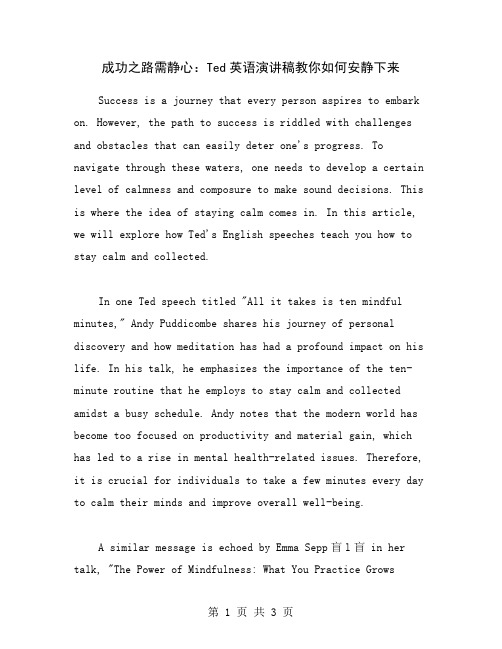
成功之路需静心:Ted英语演讲稿教你如何安静下来Success is a journey that every person aspires to embark on. However, the path to success is riddled with challenges and obstacles that can easily deter one's progress. To navigate through these waters, one needs to develop a certain level of calmness and composure to make sound decisions. This is where the idea of staying calm comes in. In this article, we will explore how Ted's English speeches teach you how to stay calm and collected.In one Ted speech titled "All it takes is ten mindful minutes," Andy Puddicombe shares his journey of personal discovery and how meditation has had a profound impact on his life. In his talk, he emphasizes the importance of the ten-minute routine that he employs to stay calm and collected amidst a busy schedule. Andy notes that the modern world has become too focused on productivity and material gain, which has led to a rise in mental health-related issues. Therefore, it is crucial for individuals to take a few minutes every day to calm their minds and improve overall well-being.A similar message is echoed by Emma Sepp盲l盲 in her talk, "The Power of Mindfulness: What You Practice GrowsStronger." She shares her research on the effects of mindfulness on performance and productivity. Emma's findings suggest that practicing mindfulness increases resilience, creativity, and cognitive flexibility, leading to better decision-making abilities. Additionally, mindfulness reduces stress, anxiety, and overall emotional reactivity, which are detrimental to mental health.Another Ted speaker, Brene Brown, takes a different approach in her talk, "The Power of Vulnerability." Brene discusses how vulnerability breeds success by sharing personal accounts of her struggle to embrace vulnerability, eventually leading to her current success. She emphasizesthat vulnerability is a necessary component for success and that embracing and leveraging it can lead to groundbreaking achievements.Jay Shetty, in his talk, "Think Like a Monk," delves into his experience as a monk and how he has learned to cultivate calmness in his life. His talk explores the many benefits of meditation, mindfulness, and gratitude in leading a successful and fulfilling life. Jay notes that when one is calm and collected, they are more likely to access theirinner wisdom and make better decisions.Finally, in his talk, "The Art of Stillness," Pico Iyer discusses how slowing down and cultivating stillness can lead to greater success. He emphasizes that in today's fast-paced world, people are too focused on the externals and have lost touch with themselves. By taking the time to be still and introspect, individuals are more likely to connect with their deeper selves, uncovering their passions, and achieving their goals.In conclusion, the journey to success often requires one to navigate through numerous challenges and obstacles. To achieve this, it is essential to stay calm, collected, and focused. The Ted speeches discussed in this article share various techniques and insights on how individuals can cultivate calmness and composure in their lives. These speeches demonstrate that calming the mind, embracing vulnerability, practicing mindfulness, and cultivating stillness are essential components of any successful individual's journey.。
TED演讲如何让你的睡眠更有效率?
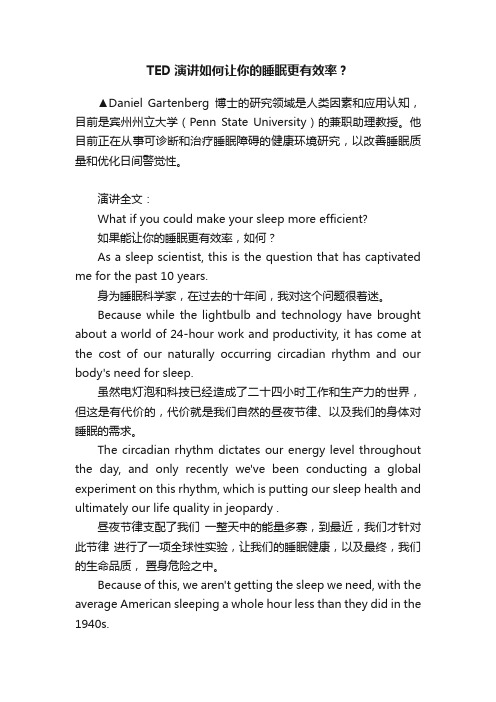
TED演讲如何让你的睡眠更有效率?▲Daniel Gartenberg博士的研究领域是人类因素和应用认知,目前是宾州州立大学(Penn State University)的兼职助理教授。
他目前正在从事可诊断和治疗睡眠障碍的健康环境研究,以改善睡眠质量和优化日间警觉性。
演讲全文:What if you could make your sleep more efficient?如果能让你的睡眠更有效率,如何?As a sleep scientist, this is the question that has captivated me for the past 10 years.身为睡眠科学家,在过去的十年间,我对这个问题很着迷。
Because while the lightbulb and technology have brought about a world of 24-hour work and productivity, it has come at the cost of our naturally occurring circadian rhythm and our body's need for sleep.虽然电灯泡和科技已经造成了二十四小时工作和生产力的世界,但这是有代价的,代价就是我们自然的昼夜节律、以及我们的身体对睡眠的需求。
The circadian rhythm dictates our energy level throughout the day, and only recently we've been conducting a global experiment on this rhythm, which is putting our sleep health and ultimately our life quality in jeopardy .昼夜节律支配了我们一整天中的能量多寡,到最近,我们才针对此节律进行了一项全球性实验,让我们的睡眠健康,以及最终,我们的生命品质,置身危险之中。
TED英语演讲稿:我们为什么要睡觉

TED英语演讲稿:我们为什么要睡觉Ladies and gentlemen,Today I would like to talk to you about something that we all do every day. It is something that we often take for granted, yet it is essential for our health and well-being. I am talking about sleep.Sleep is something that we all need, yet not all of us get enough of it. In today's society, we often prioritize other things over sleep, such as work, socializing, and entertainment. We think that we can function just fine on a few hours of sleep, but the reality is that we cannot. Our bodies need sleep to function properly, both physically and mentally.So why do we need sleep? The answer to that question is complex, but several factors come into play.The first factor is rest and restoration. When we sleep, our bodies get a chance to repair and restore themselves. Our muscles and tissues repair themselves, and we produce hormones that support growth and development. Without enough sleep, our bodies cannot perform these vital functions.The second factor is cognitive function. Sleep is essential for our brain function. When we sleep, our brains consolidate and process information that we learned during the day. This helps us to remember important things and learn new skills. Lack of sleep can lead to problems with memory, learning, and concentration.The third factor is emotional health. Sleep is necessary foremotional well-being. When we sleep, our brains process and regulate our emotions. Lack of sleep can lead to problems with emotional regulation, such as depression, anxiety, and irritability.Now that we know why we need sleep let's talk about how much sleep we actually need. The answer to that question varies depending on age, lifestyle, and individual needs. However, the general recommendation for adults is 7-9 hours of sleep per night. Children and teenagers may need more sleep, while older adults may need less.It is also important to note that the quality of our sleep is just as important as the quantity of our sleep. We need to ensure that we are getting enough deep sleep, which is the stage of sleep that is most restorative and beneficial for our bodies and minds.So what can we do to ensure that we are getting enough high-quality sleep? Here are a few tips:- Establish a bedtime routine and stick to it, even on weekends.- Create a sleep-conducive environment, which means eliminating noise, light, and distractions in the bedroom.- Avoid caffeine, alcohol, and heavy meals before bedtime.- Exercise regularly, but not too close to bedtime.- Practice relaxation techniques, such as deep breathing or meditation, to help you fall asleep.In conclusion, sleep is not a luxury; it is a necessity. We need sleep to function at our best physically and mentally. So let's make surethat we are prioritizing our sleep and giving our bodies the rest and restoration that they need. Thank you.。
Sleep to success 睡眠促进成功

Sleep to success 睡眠促进成功My big idea is a very, very small idea that can unlock billions ofbig ideas that are at the moment dormant inside us. And mylittle idea that will do that is sleep.This is a room of type-A women. This is a room of sleep-deprived women. And I learned the hard way, the value of sleep. Two-and-a-half years ago, I fainted from exhaustion. I hit my head on my desk. I broke my cheekbone, I got five stitches on my right eye. And I began the journey of rediscovering the value of sleep. And in the course of that, I studied, I met with medical doctors, scientists, and I'm here to tell you that the way to a more productive, more inspired, more joyful life is getting enough sleep.And we women are going to lead the way in this new revolution, this new feminis t issue. We are literally going to sleep our way to the top, literally.Because unfortunately for men, sleep deprivation has become a virility男子气symbol. I was recentlyhaving dinner with a guy who bragged that he had only gotten four hours sleep the night before. And I felt like saying to him -- but I didn't say it -- I felt like saying, "You know what?If you had gotten five, this dinner would have been a lot more interesting."There is now a kind of sleep deprivation one-upmanship胜人一筹.Especially here in Washington, if you tryto make a breakfast date, and you say,"How about eight o'clock?" they're likely to tell you,"Eighto'clock is too late for me, but that's okay, I can get a game of tennis in and do a few Conference calls and meet you at eight."And they think that means that they are so incredibly busy andproductive, but the truth is they're not, because we, at the moment, have had brilliant leaders in business, in finance, in politics, making terrible decisions. So a high I.Q. does not mean that you're agood leader, because the essence of leadership is being able to see the iceberg before it hits the Titanic. And we've had far too many icebergs hitting our Titanics.In fact, I have a feeling that if Lehman Brothers was Lehman Brothers and Sisters, they might still be around.While all the brothers were busy just being hyper-connected 24/7, maybe asister would havenoticed the iceberg, because she would have woken up from a seven-and-a-half-or eight-hour sleep and have been able to see the big picture.So as we are facing all the multiple crises in our world at the moment, what is good for us on a personal level, what's going to bring more joy, gratitude, effectiveness in our lives and bethe bestfor our own careers is also what is best for the world. So I urge you to shut your eyes anddiscover the great ideas that lie inside us, to shut your engines and discover the power of sleep. Thank you.我的绝妙想法实际上看似微不足道但是却能够激发层出不穷的绝妙创意这些想法雪藏于酣睡时我们的大脑中。
成功励志演讲稿英文
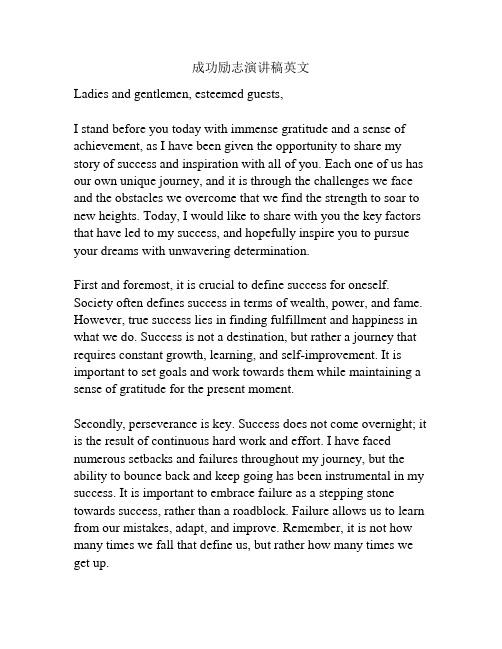
成功励志演讲稿英文Ladies and gentlemen, esteemed guests,I stand before you today with immense gratitude and a sense of achievement, as I have been given the opportunity to share my story of success and inspiration with all of you. Each one of us has our own unique journey, and it is through the challenges we face and the obstacles we overcome that we find the strength to soar to new heights. Today, I would like to share with you the key factors that have led to my success, and hopefully inspire you to pursue your dreams with unwavering determination.First and foremost, it is crucial to define success for oneself. Society often defines success in terms of wealth, power, and fame. However, true success lies in finding fulfillment and happiness in what we do. Success is not a destination, but rather a journey that requires constant growth, learning, and self-improvement. It is important to set goals and work towards them while maintaining a sense of gratitude for the present moment.Secondly, perseverance is key. Success does not come overnight; it is the result of continuous hard work and effort. I have faced numerous setbacks and failures throughout my journey, but the ability to bounce back and keep going has been instrumental in my success. It is important to embrace failure as a stepping stone towards success, rather than a roadblock. Failure allows us to learn from our mistakes, adapt, and improve. Remember, it is not how many times we fall that define us, but rather how many times we get up.In addition, success is often intertwined with passion. Pursuing our passions allows us to feel a sense of purpose and dedication towards our work. When we are passionate about what we do, it becomes easier to stay motivated and overcome obstacles. Passion is the fuel that drives us to go the extra mile, to put in the extra effort, and to never settle for mediocrity. Find your passion, and success will surely follow.Furthermore, surrounding ourselves with the right people is crucial for success. The saying "you are the average of the five people you spend the most time with" holds true. It is important to surround oneself with individuals who inspire, motivate, and push us to be better. Connect with those who share similar goals and visions, and together, great things can be achieved. Collaboration and support from others are often the catalysts for success.Lastly, a positive mindset is paramount. Success often comes with challenges and obstacles that can easily discourage and demotivate us. However, maintaining a positive attitude allows us to see obstacles as opportunities for growth and personal development. By reframing challenges as opportunities, we are able to approach them with a problem-solving mindset and find creative solutions.A positive mindset also helps us maintain resilience and believe in our own abilities, even when others doubt us.In conclusion, success is not a result of luck or circumstance, but rather a combination of hard work, perseverance, passion, a strong support system, and a positive mindset. Embrace failure, pursue your passions, surround yourself with the right people, and maintain a positive attitude in the face of adversity. And above all,remember that success is not a destination but a continuous journey of growth and self-discovery. Dare to dream big, set goals, and work tirelessly towards them, and success will be yours.Thank you.继续探索心灵的旅程,直至成功尊敬的各位,贵宾们:非常感谢能够站在这里,与您们分享我成功的故事和启发。
ted演讲稿励志中英文

ted演讲稿励志中英文Ladies and gentlemen,Good morning/afternoon/evening! It is an honor to stand before you today and share with you a story of inspiration, a story that I hope will ignite a flame within you, pushing you to pursue your dreams and overcome any obstacles that come your way.Today, I want to talk to you about the power of perseverance, about the strength that lies within each and every one of us. We all have goals, aspirations, and dreams, but sometimes, the journey to achieving them seems daunting, almost impossible. However, it is during these moments that we must remember that success is not about how hard you fall, but how hard you can bounce back.I want to share with you the story of a young girl named Sarah. Sarah was a talented dancer, with a passion for the stage and a dream of becoming a professional ballerina. However, her journey was not an easy one. She faced countless rejections, suffered from debilitating stage fright, and even had to deal with the criticism of her own body image.But Sarah did not let these setbacks define her. Instead, she used them as fuel for her fire, pushing herself to work even harder, to improve her skills, and to overcome her fears. She invested countless hours inpractice, seeking advice from her mentors, and constantly challenging herself to be the best that she could be.And guess what? Sarah's hard work and determination paid off. She eventually earned a spot in a prestigious dance company, achieving her dream of becoming a professional ballerina. But her journey did not end there. She continued to push herself, to grow as an artist, and to inspire others with her passion and dedication.Sarah's story is a testament to the power of perseverance and the importance of never giving up on your dreams. It is a reminder that success is not a straight line from point A to point B, but a series of ups and downs, of challenges and setbacks. It is about resilience, about bouncing back stronger than ever before.So, what can we learn from Sarah's story? First and foremost, we can learn that success is not about how talented or lucky you are, but about how hard you are willing to work for it. It is about putting in the hours, the sweat, and the tears necessary to achieve your goals.Secondly, we can learn that rejection is not a reflection of our worth, but rather a sign that we need to keep pushing ourselves, to keep growing and improving. Each rejection is an opportunity to learn, to grow, and to become better versions of ourselves.And finally, we can learn that our dreams are worth fighting for. No matter how difficult the journey may seem, no matter how manyobstacles we may face, we must never give up on our dreams. Instead, we must embrace the challenges, use them as stepping stones towards our goals, and believe in our own ability to overcome them.Ladies and gentlemen, let us be inspired by Sarah's story, let us be reminded of the power within us, and let us commit to pursuing our dreams with passion, determination, and unwavering belief in ourselves. Thank you for listening.。
关于好好睡觉的演讲稿英文
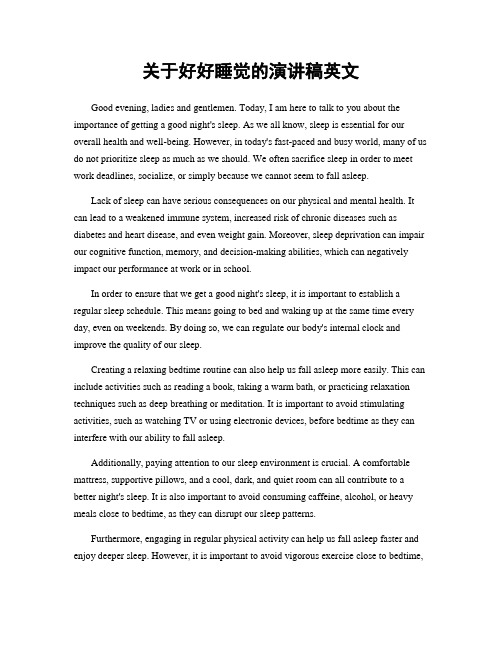
关于好好睡觉的演讲稿英文Good evening, ladies and gentlemen. Today, I am here to talk to you about the importance of getting a good night's sleep. As we all know, sleep is essential for our overall health and well-being. However, in today's fast-paced and busy world, many of us do not prioritize sleep as much as we should. We often sacrifice sleep in order to meet work deadlines, socialize, or simply because we cannot seem to fall asleep.Lack of sleep can have serious consequences on our physical and mental health. It can lead to a weakened immune system, increased risk of chronic diseases such as diabetes and heart disease, and even weight gain. Moreover, sleep deprivation can impair our cognitive function, memory, and decision-making abilities, which can negatively impact our performance at work or in school.In order to ensure that we get a good night's sleep, it is important to establish a regular sleep schedule. This means going to bed and waking up at the same time every day, even on weekends. By doing so, we can regulate our body's internal clock and improve the quality of our sleep.Creating a relaxing bedtime routine can also help us fall asleep more easily. This can include activities such as reading a book, taking a warm bath, or practicing relaxation techniques such as deep breathing or meditation. It is important to avoid stimulating activities, such as watching TV or using electronic devices, before bedtime as they can interfere with our ability to fall asleep.Additionally, paying attention to our sleep environment is crucial. A comfortable mattress, supportive pillows, and a cool, dark, and quiet room can all contribute to a better night's sleep. It is also important to avoid consuming caffeine, alcohol, or heavy meals close to bedtime, as they can disrupt our sleep patterns.Furthermore, engaging in regular physical activity can help us fall asleep faster and enjoy deeper sleep. However, it is important to avoid vigorous exercise close to bedtime,as it can have the opposite effect. Finding a balance between being physically active during the day and winding down in the evening is key to improving our sleep quality.In conclusion, getting a good night's sleep is essential for our overall health and well-being. By prioritizing sleep, establishing a regular sleep schedule, creating a relaxing bedtime routine, paying attention to our sleep environment, and engaging in regular physical activity, we can improve the quality of our sleep and reap the many benefits that come with it. So, let's all make an effort to prioritize sleep and make it a priority in our lives. Thank you.。
英语简短ted演讲稿三分钟
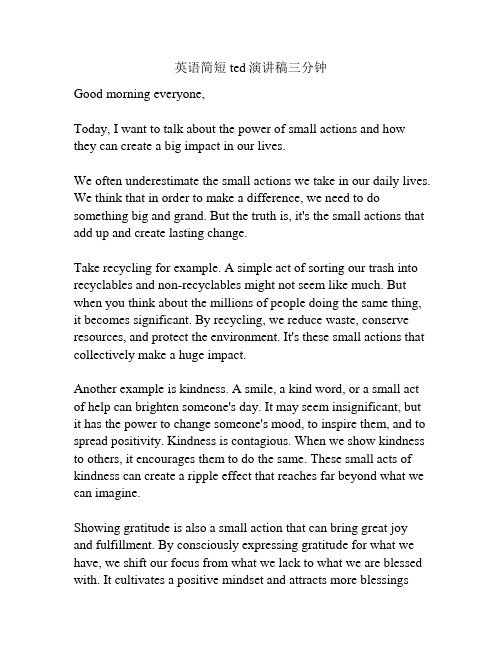
英语简短ted演讲稿三分钟Good morning everyone,Today, I want to talk about the power of small actions and how they can create a big impact in our lives.We often underestimate the small actions we take in our daily lives. We think that in order to make a difference, we need to do something big and grand. But the truth is, it's the small actions that add up and create lasting change.Take recycling for example. A simple act of sorting our trash into recyclables and non-recyclables might not seem like much. But when you think about the millions of people doing the same thing, it becomes significant. By recycling, we reduce waste, conserve resources, and protect the environment. It's these small actions that collectively make a huge impact.Another example is kindness. A smile, a kind word, or a small act of help can brighten someone's day. It may seem insignificant, but it has the power to change someone's mood, to inspire them, and to spread positivity. Kindness is contagious. When we show kindness to others, it encourages them to do the same. These small acts of kindness can create a ripple effect that reaches far beyond what we can imagine.Showing gratitude is also a small action that can bring great joy and fulfillment. By consciously expressing gratitude for what we have, we shift our focus from what we lack to what we are blessed with. It cultivates a positive mindset and attracts more blessingsinto our lives. Saying "thank you" to someone, whether it's your family, friends, or colleagues, can strengthen our relationships and bring us closer together.In our fast-paced world, it's easy to get caught up in the busyness of life and overlook the power of small actions. But it's these small actions that make life meaningful. When we take the time to appreciate the little things, to show kindness to others, and to make a positive impact in our own ways, we bring more joy and fulfillment into our lives.So let's not underestimate the power of small actions. Let's embrace them, celebrate them, and encourage others to do the same. Because together, our small actions can create a big impact and make the world a better place.Thank you.。
TED演讲【一定要睡个好觉——有一个重要的原因!】20160414

00:11Sleep. It's something we spend about a third of our lives doing, but do any of us really understand what it's all about?睡眠占用了我们一生三分之一的时间但是真正有人知道它到底是怎么回事吗?00:19Two thousand years ago, Galen, one of the most prominent medical researchers of the ancient world,proposed that while we're awake, our brain's motive force, its juice, would flow out to all the other parts of the body, animating them but leaving the brain all dried up, and he thought that when we sleep, all this moisture that filled the rest of the body would come rushing back, rehydrating the brain and refreshing the mind. Now, that sounds completely ridiculous to us now, but Galen was simply trying to explainsomething about sleep that we all deal with every day. See, we all know based on our own experiencethat when you sleep, it clears your mind, and when you don't sleep, it leaves your mind murky. But while we know a great deal more about sleep now than when Galen was around, we still haven't understood why it is that sleep, of all of our activities, has this incredible restorative function for the mind.两千年前古时候的名医伽林提出当我们醒着的时候我们大脑的原动力,它的液体会流动到身体所有其他部位维持它们的活力,但这却使大脑枯竭并且他认为,在我们睡觉的时候这些充满了我们身体其他部位的液体会再回到我们的大脑为大脑补充水分并且使我们更有精神虽然这些观点如今我们听来很荒谬但是伽林很好的解释了那些我们每天都要面对的睡眠的事情那么,根据自身的经验我们都知道如果我们睡觉了,我们的头脑会变的清醒而如果我们没有睡觉大脑就会变糊涂我们现在对睡眠的了解比伽林那个时期多了很多但是我们仍然不知道为什么在我们所有的活动中,只有睡眠有如此这般可以促使我们头脑变得清晰的功能01:17So today I want to tell you about some recent research that may shed new light on this question. We've found that sleep may actually be a kind of elegant design solution to some of the brain's most basic needs, a unique way that the brain meets the high demands and the narrow margins that set it apart from all the other organs of the body.所以今天,我想给大家讲一些近期的研究这些研究可能会揭示这些问题。
ted演讲稿5篇精选
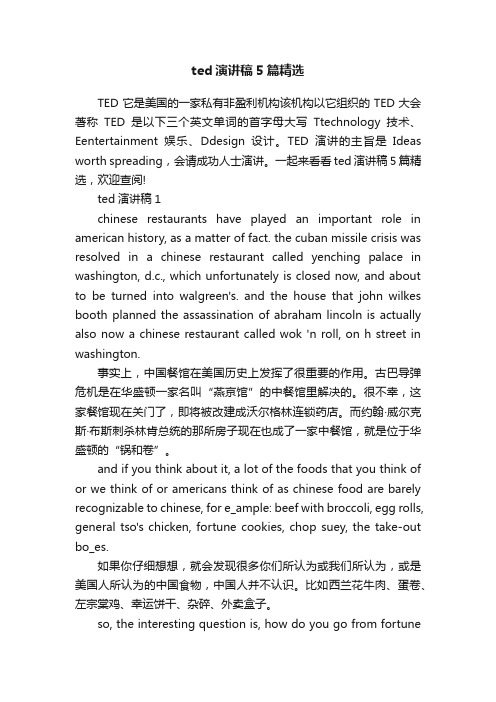
ted演讲稿5篇精选TED它是美国的一家私有非盈利机构该机构以它组织的TED大会著称TED是以下三个英文单词的首字母大写Ttechnology技术、Eentertainment娱乐、Ddesign设计。
TED演讲的主旨是Ideas worth spreading,会请成功人士演讲。
一起来看看ted演讲稿5篇精选,欢迎查阅!ted演讲稿1chinese restaurants have played an important role in american history, as a matter of fact. the cuban missile crisis was resolved in a chinese restaurant called yenching palace in washington, d.c., which unfortunately is closed now, and about to be turned into walgreen's. and the house that john wilkes booth planned the assassination of abraham lincoln is actually also now a chinese restaurant called wok 'n roll, on h street in washington.事实上,中国餐馆在美国历史上发挥了很重要的作用。
古巴导弹危机是在华盛顿一家名叫“燕京馆”的中餐馆里解决的。
很不幸,这家餐馆现在关门了,即将被改建成沃尔格林连锁药店。
而约翰·威尔克斯·布斯刺杀林肯总统的那所房子现在也成了一家中餐馆,就是位于华盛顿的“锅和卷”。
and if you think about it, a lot of the foods that you think of or we think of or americans think of as chinese food are barely recognizable to chinese, for e_ample: beef with broccoli, egg rolls, general tso's chicken, fortune cookies, chop suey, the take-out bo_es.如果你仔细想想,就会发现很多你们所认为或我们所认为,或是美国人所认为的中国食物,中国人并不认识。
Ted英语演讲稿:Be an Opportunity Maker

Ted英语演讲稿:Be an Opportunity Maker Ladies and gentlemen,Today, I stand before you to emphasize the importance of being an opportunity maker. In a world filled with uncertainties and challenges, it is more crucial than ever to possess the ability to create opportunities for ourselves and for others. So, let us take a moment to reflect on what it means to be an opportunity maker.Firstly, being an opportunity maker means taking initiative. It means being proactive and not waiting for things to happen. Instead, we should actively seek out opportunities and take the necessary steps to make them a reality. It requires a mindset that embraces change and sees possibilities where others may see only obstacles.Secondly, being an opportunity maker means being open-minded. It means being willing to step outside of our comfort zones and explore new ideas and perspectives. By doing so, we enhance our creativity and problem-solving skills, enabling us to identify opportunities that others may overlook. It is through this open-mindedness that we uncover innovative solutions and embrace the unknown.Furthermore, being an opportunity maker means being a catalyst for change. It means recognizing the power we have to make a difference in the lives of others. Whether it is through mentorship, volunteering, or simply lending a helping hand, we can create opportunities for those around us to succeed. By fostering a supportive and inclusive environment, we empower others to reach their full potential.Lastly, being an opportunity maker means taking risks. It means being bold and fearless in the face of uncertainty. We must be willing to step outside of our comfort zones and embrace the possibility of failure. For it is often through failure that we learn and grow the most. By taking calculated risks, we expand our horizons and create opportunities for personal and professional growth.In conclusion, being an opportunity maker is not just about taking advantage of opportunities that come our way. It is about actively creating opportunities for ourselves and for others. In a world that is constantly changing and evolving, our ability to adapt and seize opportunities is what sets us apart. So, let us embrace the mindset of an opportunity maker and be the catalysts for positive change in our lives and in the lives of others.Thank you.。
灵感之光:三分钟英文励志演讲稿
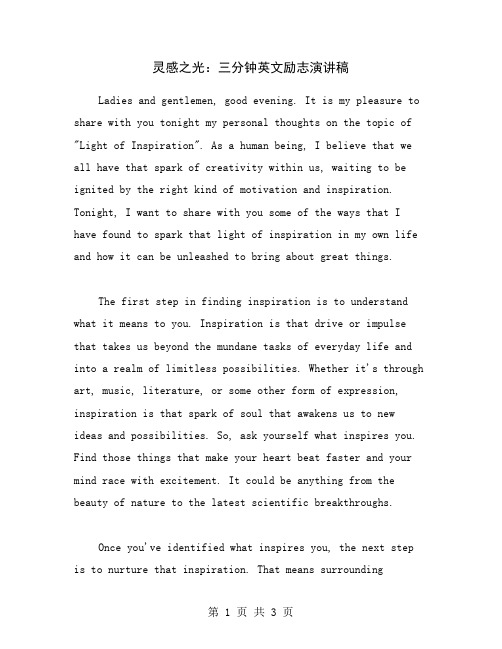
灵感之光:三分钟英文励志演讲稿Ladies and gentlemen, good evening. It is my pleasure to share with you tonight my personal thoughts on the topic of "Light of Inspiration". As a human being, I believe that we all have that spark of creativity within us, waiting to be ignited by the right kind of motivation and inspiration. Tonight, I want to share with you some of the ways that I have found to spark that light of inspiration in my own life and how it can be unleashed to bring about great things.The first step in finding inspiration is to understand what it means to you. Inspiration is that drive or impulse that takes us beyond the mundane tasks of everyday life and into a realm of limitless possibilities. Whether it's through art, music, literature, or some other form of expression, inspiration is that spark of soul that awakens us to new ideas and possibilities. So, ask yourself what inspires you. Find those things that make your heart beat faster and your mind race with excitement. It could be anything from the beauty of nature to the latest scientific breakthroughs.Once you've identified what inspires you, the next step is to nurture that inspiration. That means surroundingyourself with things that feed your creativity and push youto explore the limits of your potential. If you love to write, surround yourself with books and other writers who inspire you. If you're an artist, visit museums and galleries to see the work of others who share your passion. Similarly, ifyou're a musician, go to concerts and listen to recordings of other musicians who inspire you.The key to nurturing inspiration is to keep your mindopen and to embrace new ideas. That means being curious, exploring new things, taking risks, and being willing to fail. In fact, some of the greatest inspiration comes from failure. When we fail, we learn what doesn't work, which gives us new insights and new directions to pursue.Finally, the key to unleashing the full potential of inspiration is to take action. The world is full of ideas,but ultimately, it is action that brings those ideas to life. So, take those ideas and turn them into something tangible. Write that book, paint that painting, or compose that song. Whatever it is, don't be afraid to take that first step. The world needs your voice and your vision.In conclusion, the light of inspiration is a powerful force that can transform our lives and the world around us.It comes from within us, but it also comes from the world around us. So, open your heart and mind to the possibilities, nurture your inspiration, and take action to make your dreams a reality. Remember, we are all creators, and the world is waiting for what you have to offer. Thank you.。
唤起成功心——英语演讲稿

唤起成功心——英语演讲稿Ladies and gentleman, esteemed guests and fellow students, good afternoon. It is a great honor for me to have this opportunity to deliver a speech on the topic of "Awakeningthe Heart of Success".We all have dreams, aspirations, and goals. We all wantto succeed in our respective fields and make a difference in the world. However, the reality is that the path to successis often filled with obstacles, failures, and setbacks. It is easy to lose faith and become discouraged. That's why, it is important to awaken the heart of success within ourselves and keep striving towards our dreams.So what does it mean to wake up the heart of success? Simply put, it means cultivating positive habits, attitudes, and behaviors that are aligned with our goals. It involves developing a growth mindset, persevering through challenges, and remaining optimistic in the face of adversity. Here are some strategies that can help us awaken our heart of success:Firstly, set clear and specific goals. Success is subjective, and therefore, it is important to define whatsuccess means to us. It is not enough to have a vague idea of what we want to achieve. We need to set measurable, achievable, and time-bound goals that will help us stay focused and motivated. Moreover, having a clear goal helps us track our progress, celebrate our accomplishments, and learn from our failures.Secondly, cultivate a growth mindset. Our mindset plays a vital role in determining our level of success. If we believe that our abilities are fixed and cannot be improved, we are more likely to give up when we face challenges. However, if we believe that we can learn, grow, and develop new skills, we are more likely to persevere and achieve our goals. Therefore, it is important to adopt a growth mindset that embraces challenges, values effort, and sees failure as an opportunity to learn and improve.Thirdly, take action and embrace failure. Success requires action. It is not enough to have a great dream and a positive mindset. We need to take consistent and deliberate steps towards our goals. This involves stepping outside our comfort zone, taking risks, and embracing failure as anatural part of the process. Moreover, failure is an opportunity to learn, to adapt, and to improve. We need toreframe our perspective on failure and see it as a necessary step towards our success.Lastly, surround ourselves with positive and supportive people. Success is not a solo journey. We need a strong support system of family, friends, mentors, and peers who can provide encouragement, feedback, and guidance. It is important to surround ourselves with people who are positive, honest, and have our best interests at heart. These people can help us stay accountable, motivated, and on track towards our goals.In conclusion, awakening the heart of success is a lifelong process that requires continuous effort, determination, and perseverance. It involves setting clear goals, cultivating a growth mindset, taking action, embracing failure, and surrounding ourselves with positive and supportive people. Let us all strive to awaken our heart of success and make a positive impact in the world. Thank you.。
TED演讲辞:如何成功?请多睡一会(阿里安娜·赫芬顿)

TED演讲辞:如何成功?请多睡一会(阿里安娜·赫芬顿)演讲人:Arianna Huffington时长:04:10阿里安娜·赫芬顿(Arianna Huffington),美国《赫芬顿邮报》共同创始人。
著有《第三世界美国》,人称新媒体女皇。
我的绝妙想法实际上看似微不足道,但是却能够激发层出不穷的绝妙创意,这些想法雪藏于酣睡时我们的大脑中,那么如何用我们的想法使之释放呢。
就是睡觉。
在座的各位女士都是最优秀的人,在座的各位女士,也都饱受睡眠不足的折磨,我不辍的思索着睡眠的价值,两年半以前,我因过度劳累而晕倒,头撞在了桌子上,下颌骨也骨折了,我的右眼缝了五针,而后我便开始重新探索睡眠的价值,在这个过程中,我深入研究,与医学博士、科学家们会面,那么我今天想告诉大家,想要变得更加高效,更有激情,生活更加有趣,请保持睡眠充足,我们女性将要在这场新的革命中,新的女权主义争议中,引领潮流,我们要一路睡到制高点,没错,睡!因为很不幸地,对男士们来说,睡眠不足成了男子汉气概的象征。
我最近和一位男士一起吃晚餐,他和我吹嘘前一晚只睡了四个小时,其实我想对他说,不过还是没说出口,我想要说的是:你知道吗,要是你能多睡一个小时,那今晚的谈话会比现在有趣的多。
现在有一种睡眠不足,叫作虚荣心作崇,尤其是在华盛顿这里,如果你想预约一顿早餐,比如,“八点钟怎么样?”他们会说,哦,八点钟对我来说太晚了,不过没关系,我可以在和你见面之前先打上一局网球再打几个电话会议,那么他们会认为这样意味着他是如此的忙碌和高效,但是事实却并非如此,因为当前世界,我们有十分精明的领导者,在商界、金融界,政界,他们却做了许多糟糕的决定,因此高智商并不是成为一个好领导者的唯一先决条件,因为领导力的秘诀,在于能具有超乎常人的预见力。
但事实上我们却为此受到太多次的教训,事实上,我觉得如果雷曼兄弟换成雷曼兄妹的话,那么他们还不至于破产倒闭,因为当所有的男士们在忙着像机器一样一刻不停地连轴转时,也许有一位女士会注意到将要来临的危机,因为她会从七个半小时或者八个小时的睡眠中醒来,并对全局形势透彻于心。
- 1、下载文档前请自行甄别文档内容的完整性,平台不提供额外的编辑、内容补充、找答案等附加服务。
- 2、"仅部分预览"的文档,不可在线预览部分如存在完整性等问题,可反馈申请退款(可完整预览的文档不适用该条件!)。
- 3、如文档侵犯您的权益,请联系客服反馈,我们会尽快为您处理(人工客服工作时间:9:00-18:30)。
(Applause)
This is a room of type-A women. This is a room of sleep-deprived women. And I learned the hard way, the value of sleep. Two-and-a-half years ago, I fainted from exhaustion. I hit my head on my desk. I broke my cheekbone, I got five stitches on my right eye. And I began the journey of rediscovering the value of sleep. And in the course of that, I studied, I met with medical doctors, scientists, and I'm here to tell you that the way to a more productive, more inspired, more joyful life is getting enough sleep.
Thank you.
(Applause)
TED演讲:想成功,请多睡一会儿
My big idea is a very, very small idea that can unlock billions of big ideas that are at the moment dormant inside us. And my little idea that will do that is sleep.
So as we are facing all the multiple crises in our world at the moment, what is good for us on a personal level, what's going to bring more joy, gratitude, effectiveness in our lives and be the best for our own careers is also what is best for the world. So I urge you to shut your eyes and discover the great ideas that lie inside us, to shut your engines and discover the power of sleep.
(Applause)
And we women are going to lead the way in this new revolution, this new feminist issue. We are literally going to sleep our way to the top, literally.
(Laughter)
There is now a kind of sleep deprivation one-upmanship. Especially here in Washington, if you try to make a breakfast date, and you say, "How about eight o'clock?" they're likely to tell you, "Eight o'clock is too late for me, but that's okay, I can get a game of tennis in and do a few conference calls and meet you at eight." And they think that means that they are so incredibly busy and productive, but the truth is they're not, because we, at the moment, have had brilliant leaders in business, in finance, in politics, making terrible decisions. So a high I.Q. does not mean that you're a good leader, because the essence of leadership is being able to see the iceberg before it hits the Titanic. And we've had far too many icebergs hitting our Titanics.
In fact, I have a feeling that if Lehman Brothers was Lehman Brothers and Sisters, they mightstill be around. (Applause) While all the brothers were busy just being hyper-connected 24/7, maybe a sister would have noticed the iceberg, because she would have woken up from a seven-and-a-half- or eight-hour sleep and have been able to see the big picture.
(Laughter)
(Applause)
Because unfortunately a virility symbol. I was recently having dinner with a guy who bragged that he had only gotten four hours sleep the night before. And I felt like saying to him -- but I didn't say it -- I felt like saying, "You know what? If you had gotten five, this dinner would have been a lot more interesting."
